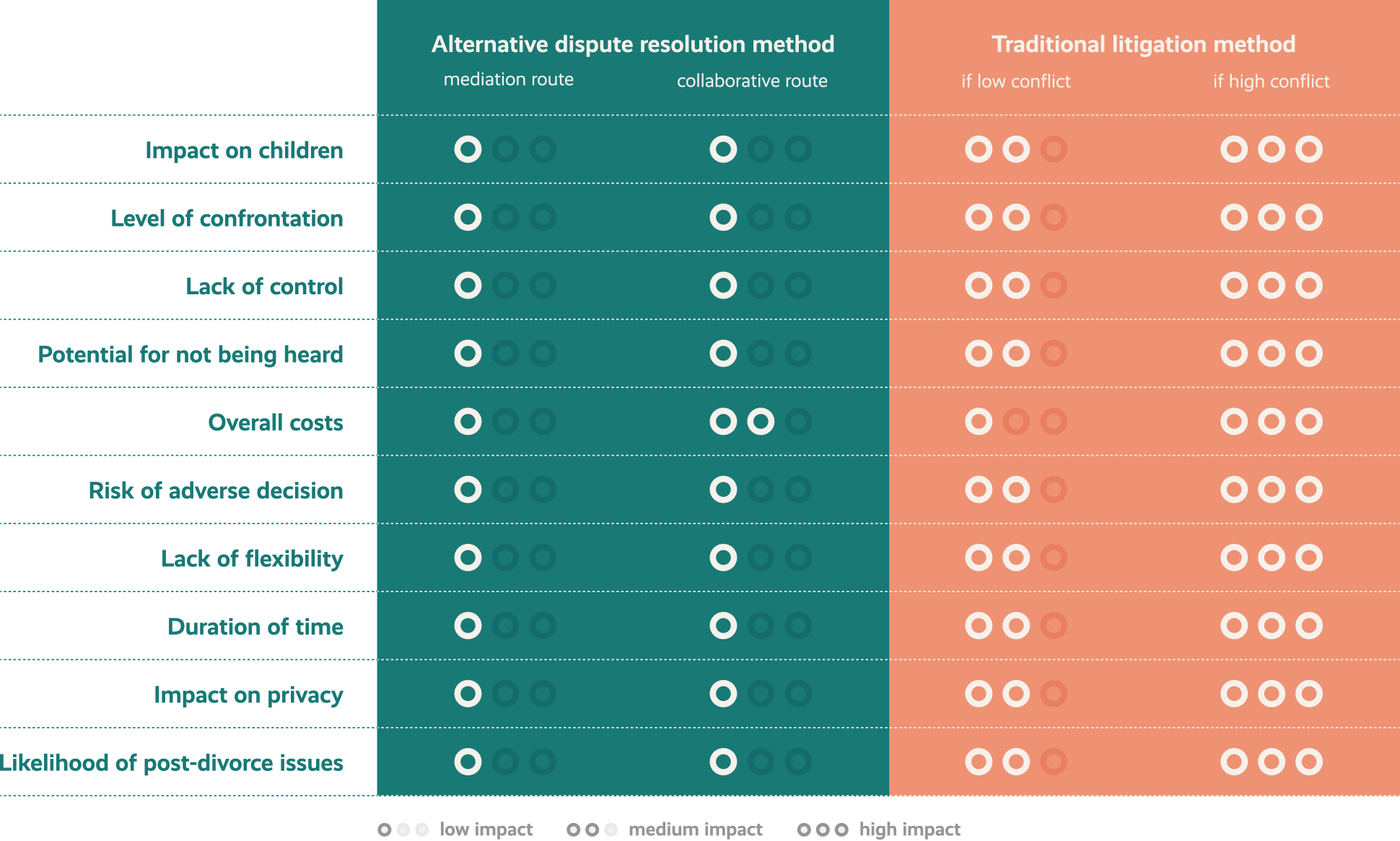
Making arrangements for the children where they are to live and when they are to see the parent they are not living with.
Making sure you are able to meet your living expenses while everything else is sorted out and in the short and long term.
Identifying the assets which need to be divided, and their value.
Exploring the options as to how the assets can be divided.
If agreement is reached on all these issues a binding legal agreement (separation agreement) is signed.
It's not always possible for separating couples to come to agreement on access to children, property and money issues. Traditionally this has always been resolved through the court but there are alternative options for dispute resolution:
Mediation: This involves you and your spouse working with a trained, impartial mediator or trainer solicitor to reach agreement.
Collaborative Practice: This is a non-confrontational approach to agreeing the legal, financial and practical arrangements for your separation and divorce. Spearheaded by a lawyer who will be trained in collaborative law and who can involve other professionals like financial advisors and family counsellors to resolve specific issues, you follow a formal process that results in a binding agreement.
Court proceedings: If all other methods fail or are not appropriate, then it may be necessary to raise court proceedings. The advantage here is that an enforceable decision is made and an end is brought to the dispute. But, the main disadvantage is that the parties are giving the power to make the decision to a third party (the Judge) and it is therefore taken out of their hands. Sometimes a decision is made by a Judge which is not attractive to either party. Court proceedings are expensive and take money away from the pot to be divided between the parties and once the court has made the decision, the parties have to abide by it.

Collaborative Practice allows a separating couple to reach agreement through a calm and respectful discussion which takes place around a table. It removes the need for lengthy correspondence between lawyers or having the matter decided through a court action. There are normally a number of meetings. Each meeting is carefully planned in advance by the lawyers who identify the issues which need to be discussed.
After each meeting, everyone involved receives a summary of the discussions which identifies the next steps which each person has to take before the next meeting.
This structure allows key immediate issues of concern such as arrangements for the children and transitional financial arrangements to be put in place quickly. Once matters are agreed, a legal agreement is signed and a divorce arranged if needed.
The separating couple attend the meetings with their lawyers. The lawyers work with the couple to help them reach agreement.
Other collaborative professionals can be brought in to help as necessary. These include financial specialists and family consultants.

The Collaborative Process is based on a contract which all involved sign. It commits everyone including the professionals to acting with respect and integrity throughout the process. The contract also prevents the couple from instructing the collaborative lawyers to raise a court action if their negotiation fails. This means that all those participating in the meeting have an interest in reaching a successful conclusion.
Specially trained teams including Lawyers, Financial Specialists and Family Consultants will work with you to provide a non-confrontational divorce.
The lawyers manage the process. They arrange the collaborative meetings and liaise with any other collaborative professionals whom the couple agree should be involved.
They work as a team with the couple and those professionals to help them reach agreement. They will meet separately with their own clients where necessary to provide individual legal advice and support.
They will:
Ensure that the separating couple are able to conduct their discussion in an atmosphere of support and understanding.
Work to minimise conflict in the discussions which take place.
Ensure that the wellbeing of any children is made a key priority.
Conduct all discussions in a non-adversarial manner.
Ensure that full regard is given to each person’s concerns and issues.
Ensure that assistance is made available to those having emotional difficulty dealing with the process.
Ensure that any decision is based on full understanding and consent.
Ensure that comprehensive and clear legal information is given to the couple.
Direct parties to use the service of other collaborative professionals where these are needed.
Finalise the legal aspects of the separation and arrange a divorce if applicable.
Our Financial Specialists aim to ensure that a couple separating make informed financial decisions based on sound information. They are qualified Financial Planners or in some cases, Accountants.
They help the couple understand the range of options available to them so that they can make the right decisions for the financial wellbeing of themselves and their children.
Financial specialists trained in collaborative practice work can provide invaluable assistance in the information-gathering needed in separation situations. They act in a neutral capacity. They assist the collaborative lawyers and the couple in providing clear information on which the settlement discussions can be based and they help identify the financial matters which need to be decided and what financial options might be available to the couple who are separating.
Financial assets such as pensions and policies can have significant value and there will be different possible ways of dealing with them. How they are dealt with can have significant implications for financial health after separation in the longer term.
Sometimes there are complex assets such as business interests which have to be valued and perhaps divided.
The involvement of a financial specialist allows clear decision-making based on a full understanding of the nature of the assets to be split and allows the financial possibilities of a settlement to be maximised.
They will:
Provide clear and accurate financial information as a starting point to the discussion.
Enable informed financial choices to be made.
Provide creative financial settlement options.
Allow separating couples to understand the possibilities for their future financial health.
Sometimes emotions can make it difficult for couples to engage in the Collaborative process even though they wish to proceed with it. Our Family Consultants are all members of the British Association of Counselling and Psychotherapy. They can assist in the collaborative process by providing emotional support to the couple either individually or together so that the process runs smoothly. They can also help the couple agree arrangements for their children.
Support for you
Not everyone needs this but for some people this support is essential to enable them to provide an emotional anchor which enables them to make good clear and informed decisions and to deal with parts of the process which they find challenging. Family consultants can help provide the confidence needed to make the collaborative process a success.
Help with your children
Separation brings huge changes in family life especially for children. It is vital that parents in separation are able to be supported in making good decisions in relation to their children which are focused on the children’s best interest and which above all protect them from conflict. It is said that it is not separation that damages children but the way the process is handled by the adults involved. Collaboratively trained Family Consultants have the knowledge and skills to work with the couple to help them connect fully with their children’s needs in separation and to assist them in agreeing arrangements for their children in an atmosphere of respect and understanding.
To help you decide if Collaboration is the best choice for you, ask yourself the following questions:
Do I want a civilised, respectful resolution of the issues arising from my separation?
Do I want to keep open the possibility of civil contact with my spouse or partner in the future?
Do I want to have the best co-parenting relationship possible with my spouse or partner?
Do I want to protect my children from the fallout associated with traditional court cases?
Do we have friends and/or extended family in common that each of us wants to keep in contact with?
Do I want to take personal responsibility for handling this conflict with integrity?
Do I want to retain control over the decision making as opposed to leaving it to a judge?
Do I want to reach an outcome more specific and suitable to my personal family situation?
Do I understand that conflict resolution with integrity involves not only achieving my goals but also finding a way to achieve the reasonable goals of my spouse or partner and our children?
Will I commit all my resources and energy towards creative problem solving rather than towards seeking recrimination and/or revenge?
Am I ready to fix the problem rather than to fix blame?
If you can answer “Yes” to these questions, and you think that your spouse or partner will do the same, then collaboration is probably the best choice for you.
The next step is for you to speak with a collaborative practitioner – it is up to you whether you speak to a lawyer, a family consultant or a financial specialist. We have members throughout the country, any of whom will be more than happy to speak to you informally by telephone or at a meeting.
Click here to search our specially trained Collaborative Practitioners
Search our
Practitioners
Download our
Brochure
How does
it work